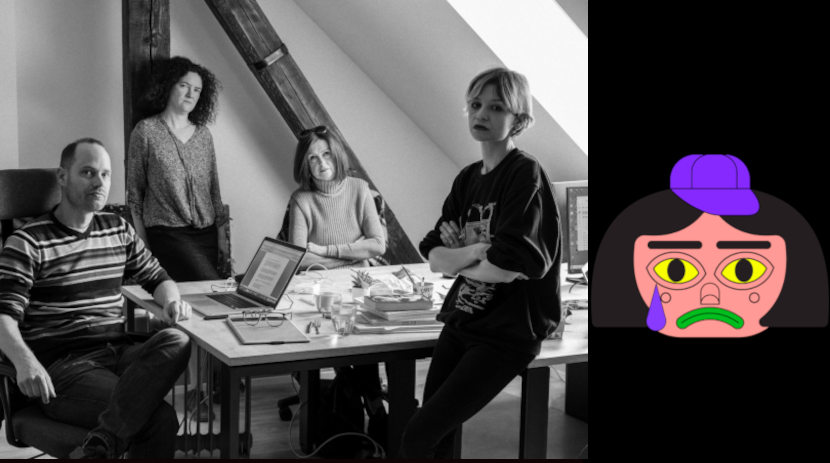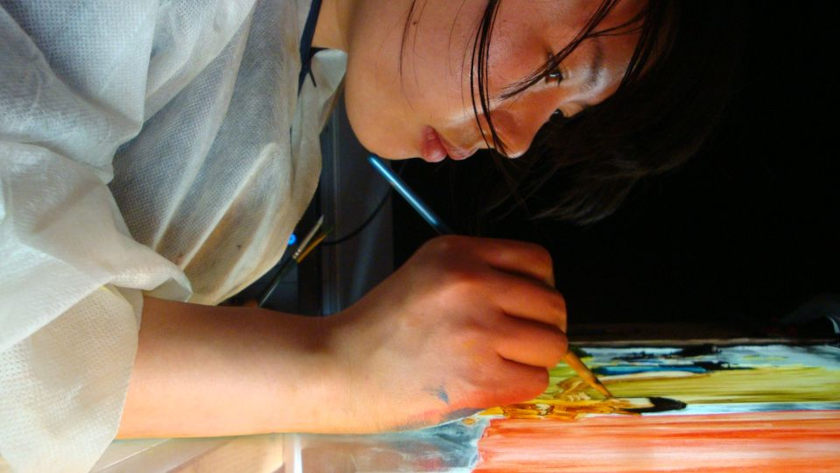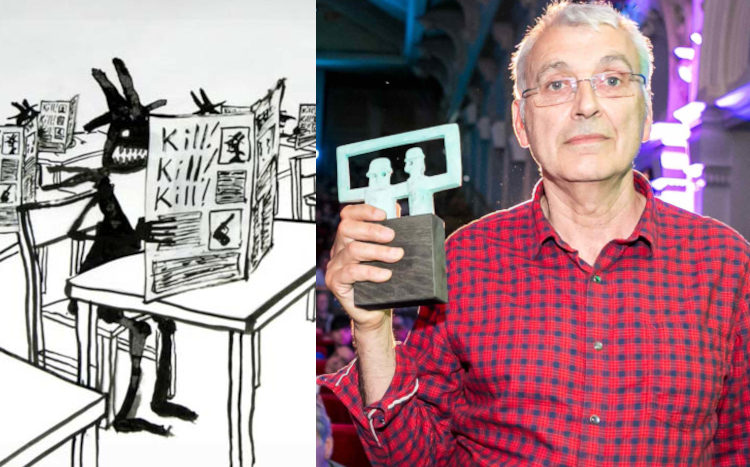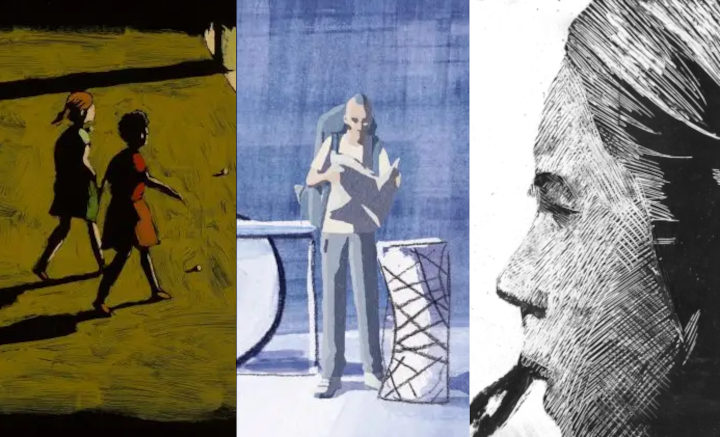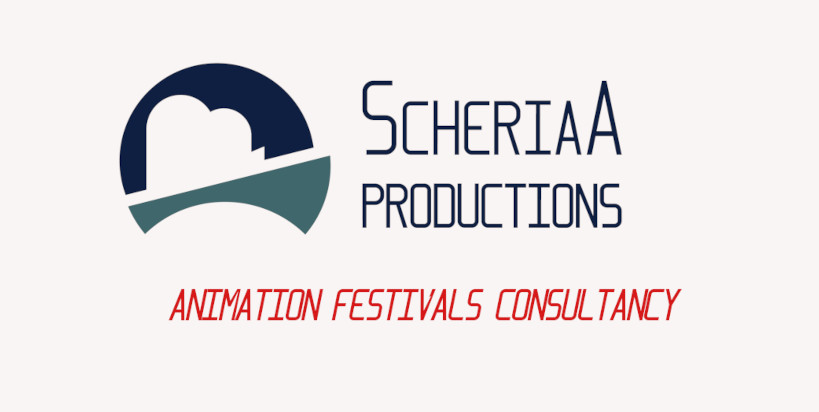Animafest Zagreb 2023 Report: On Rendezvous with the Day and Time(s)
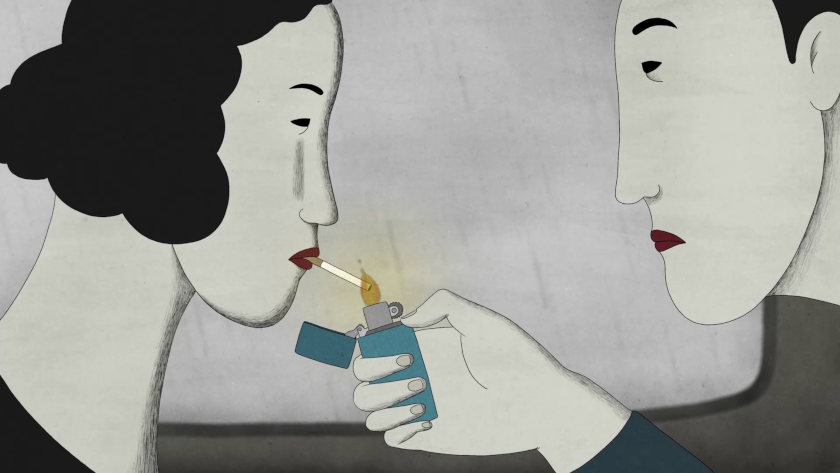
For me that happened to be the first, over a few years of compelled hiatus (and what years!) live encounter – and a pointedly refreshing reminder of what animation festival, like Zagreb especially, really is (apart from and unlike all the passworded viewing platforms and zoom-boxed or YouTube-canned presentations-events): a kind of multilayered 'happening', with everything beyond and around the competitions proper, from special programs to exhibits, book presentations, master-classes and the like; formal discussions and just talks-talks-talks, over the drinks and in friendly embraces, or not, from hotel breakfast to after-screening, after-midnight endless mingling on the common ground…
I was to take part first of all in the anniversary 10th Scanner symposium (as had been doing periodically from the very first one) that had become an important, among the very few in the world, gathering platform for animation studies. Its agenda looked engaging and thought-provoking enough on various planes.
But then the burning agenda of the day and time caught up with us, right at the opening morning – with the news of the Kakhovka dam destruction in Ukraine, presumably by Russian occupying forces, and the disaster of planetary scale in its wake… And suddenly, or not really so, the academic presentations or historical retrospectives, like on (post)apocalyptic-dystopian themes-worlds in sci-fi animation, would resonate in tune… (In my own paper, on the war-violence-riddled sci-fi tropes from former decades the title 'Warning shots' read now probably much closer to reality than to critical metaphor – and than I could've wished for perhaps…)
With that – we do what we do, – the other, more theoretical thematic fields and schools of thought there retain the topicality in a different vein: the keynote address by Suzanne Buchan (Animafest Award for Outstanding Contribution to Animation Studies recipient) and panels on new-old definitions, technologies, and interactions dealt closely with issues of today's (or tomorrow's) identity and cultural status-place of the medium and its (self)understanding and functioning.
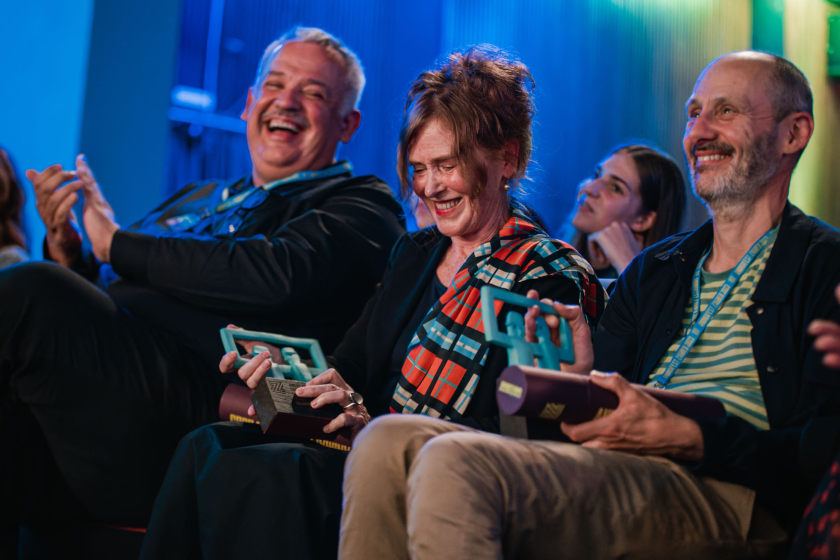
Nikica Gilić, Suzanne Buchan, Robert Bradbrook at Animafest Zagreb 2023 (c) Animafest Zagreb
What was especially engaging to me personally – perhaps, Suzanne's focus, in talk and questioning throughout, on the evolution and self-reflection of the animation studies themselves; as also was the idea of self-reflexivity as means of distinguishing between the 'tool' and the 'medium' in today's animation placing on the screen-culture field in Mina Sablić Paparjić's paper. And then – couldn't help being astonished by the extent of some newest tech practices, like AI video dubbing, analyzed by Christopher Holiday; or on the other plane – the aesthetic resources of the pretty old ones, like ‘animated typography’, inspiringly presented by João Paulo Schlittler.
Which in sum and detail, to me, really echoed, in turn, within the larger rich festival context, its core and ‘side-shows’ alike.
This year's guest of honor, as Life Achievement Award laureate, was William Kentridge; his works and sheer personality, as if a cultural artifact in its own right, seemed to be omnipresent. To me personally, his Ursonate performance turned out to be the festival centerpiece, in many respects (can't resist noting that among the accompanying musicians on stage was also none other than the festival director Daniel Šuljić). But besides the rest, the projections over the reading-reciting, and over the textual matter on the screen-page; as well as optical 'animating machines' of certain kind at his exhibit; and the very film techniques variety of his, from the trademark charcoal fluidity to masked actors live in montage; along with 'organic politicization', so to speak, precursory to post-colonial discourse angles – all that could've served as immediate illustrations to our scholarly discussions (say, on the poetry in animation or interaction with other/different artforms/practices). And then again – posed anew the old dichotomy of different streams/subcultures: animation within the film-making milieu proper vs. art-gallery/installation/stage environment – nowadays, in the almost omni-digital world already, of course, acquiring new dimensions before blurring old/conventional boundaries completely. To leave alone the very range of genre-forms and applications.

William Kentridge, Ursonate Performance at Animafest Zagreb 2023 (c) Animafest Zagreb
In this regard, another sideshow, a fest-inside-fest of sorts, ‘Shcha 7 sec’ was also quite interesting, and maybe pointedly promising: at a short call, without preselection comprised and presented at the open-air café-lawn program of exactly 7-second microfilms, over a hundred in total – by now already proven as a paradoxically fruitful-rich format at several editions, initially on Russian ground, and now in a status of ‘nomadic festival’, as the co-founder/producer and editor Nadezhda Svirskaia puts it.
Turning to the core content: I didn't have a chance this time, alas, to pay proper attention to all the features in the competition, the winner in which, an unconventionally 'grown-up' (to avoid the dubious term 'adult'), personal and artistic 'My Love Affair with Marriage' by Signe Baumane (Latvia, US, Luxembourg, 2022) continues to collect honors around the festival circle, thus contributing, arguably, to shifting focus in this category generally.
The issue of identity-belonging, to a particular realm especially, turns out to be thorny indeed in the main festival context as well. Awarding of Grand Prix to 'Oneluv' by Varya Yakovleva (Moscow studio Shar, released in January 2022) caused a stir of controversy (maybe quite predictably or justifyingly so – though the director fled the country after the invasion and had voiced expressly her anti-war position in word and deed) – boiled over mainly post-factum in social media (see, most notably, posts by Anastasiya Verlynska, Varya Yakovleva, Varya Yakovleva, Olga Bobrowska and comments to those.
Not diving into this debate in earnest – that should be possibly reserved for a special occasion – I'd mention just a few points. Animafest's decision, indicated openly ahead of time, to accept Russian state-funded (which in itself, however, is not exactly a clear-cut notion but rather a complicated issue, to my mind and experience, that can be related to different environments and circumstances – and as such probably would've deserved deeper attention) without mentioning the country of origin-production– can or should be, a matter of discussion in its own turn, and maybe in a broader context. Festivals are, in fact, as some colleagues passionately insisted, political creatures in certain ways, at the very least in terms of cultural policies; and we certainly cannot hide from the concerns and troubles of the day and time. And another thing of note for now: in FB comments, none other than Paul Bush (who participated in the VR competition this year) has pointedly reminded us of the lessons from the boycott of the apartheid South-African regime in sports and culture – which, by the way, also played a role in Kentridge professional biography.

Oneluv
With all that, ‘Oneluv’ is indeed a remarkable and bold, if overtly uneven, piece of animated filmmaking, in its “shivering style magnifying the story of abuse", as the jury statement goes. And more, I'd add: both the narrative (that can be considered, maybe, in affirmingly feminist terms of certain, forceful variety) and the very stylistic kaleidoscope, equally audacious and vulnerable, without excuse or fear, and moving angles in staccato editing – as if called at the same time to introspect and (de)mask all the character-types in their roles and positions. Which altogether reads, to my mind, also as a broader social diagnostic of the underlying (in)human condition.
And again, we face the climate of violence, permeating the social fabric, in ‘Box Cutters’, (France, Netherlands, South Africa, 2023). In her densely meditative yet sharp visual narration, in black-sand (or liquid powder, for that matter) semi-fluid materiality, Naomi Van Niekerk certainly picks up the larger technique and stylistic paradigm, and problematics in part, of that same Kentridge – no escape – and builds on further or sideways, I’d believe.
On the broadly similar tune, in a way, speaks, within a different, historical perspective and dimension, film of Sasha Svirsky 'The Master of the Swamps’ (Germany, 2023) – as a part of emigre YouTube project Great Russian Villains that takes directly on the basic mythology behind the post-neo-imperial national ressentiment (to furious outrage, characteristically, on domestic 'patriotic' venues). This particular piece attempts a drastic deconstruction of Peter the Great, no less, the preeminent builder of the Russian empire, over the sweat and blood of the nation, westernizing it without regard for dignity or life. Within this sort of commissioned frame, Svirsky finds, it looks, a promise for new development: in his own voiceover narration, a severely articulated meditation on the theme; in more constraint and topical but not less striking imagery.
Another commission-framed and of close problematics film caught attention in the main competition– ‘Mao’s Mango Cult’ by Kayu Leung (TEDed Talk / France, United States, Hong Kong, 2022). Perhaps, too much of a crash course for beginners on the 'cultural revolution' in China, but still involving, as yet another fresh attempt at deconstructing the historical mythology, be that through peculiar emblematic details.
In Ukrainian-German entry ‘Mariupol. A Hundred Nights’(juror Hisko Hulsing's choice for the individual special award), director Sofiia Melnyk takes up an almost insurmountable challenge to frame an ultimate tragedy of the moment and naked energy of its the human document, kid’s drawing in particular, over the strong expressive music score – with adequate force and tact; even if to uneven effect.

Mariupol, A Hundred Nights
Besides, my scholarly eye couldn’t pass by ‘Chamber of Shadows’ by Seyoung Ok (South Korea, 2023) – a wholehearted tribute to the great pioneer of the image in motion Eadweard Muybridge, along with a thoughtfully playful exploration of his heritage in light of the changing medium.
There was yet another award to 'unflagged' Russian entry, in the children's category (judged in Zagreb by kids themselves), 'Socks for the Star' by Olga Titova – potentially maybe even more problematic, since comes from state-run legacy studio Soyuzmultfilm (marked just by hardly recognizable acronym SMF), with the director's status-position not in public knowledge (read also here). The film itself is rather cozily inventive, with an all too familiar good-old-school tone and moral sensibility. In contrast, the special mention recipient 'Let's Roll', freshly imaginative collective student work from France, looked and drove almost futuristic, even close to VR illusion, with landing in homely reality at the end.
Somewhat unexpected was the film by Tal Kantor (who also sat on the main jury and led a masterclass) 'Yellow Light' (Israel, 2023) where in the wings of a gentle atmospheric girl-dog-walk storyline the director as if crack-opens a peephole into her technique and the art of animated conditionality as such. Which as well was explicitly in play in the already acclaimed Iranian film 'Our Uniform' by Yegane Moghaddam (2023) made exactly on and out of the girls-woman's obligatory dresses, from childhood onward, viewing the texture of life through the prism of its covering fabric and cut; a humble yet clear protest and self-assuring gesture. And then to note is also the film of yet another, though not quite recent, Russian expat Dina Velikovskaya (living and working in Germany for years now), ‘Princess Aubergine’ (2022), where with elegant simplicity and clever soft wit dances around rather complicated family-social themes.
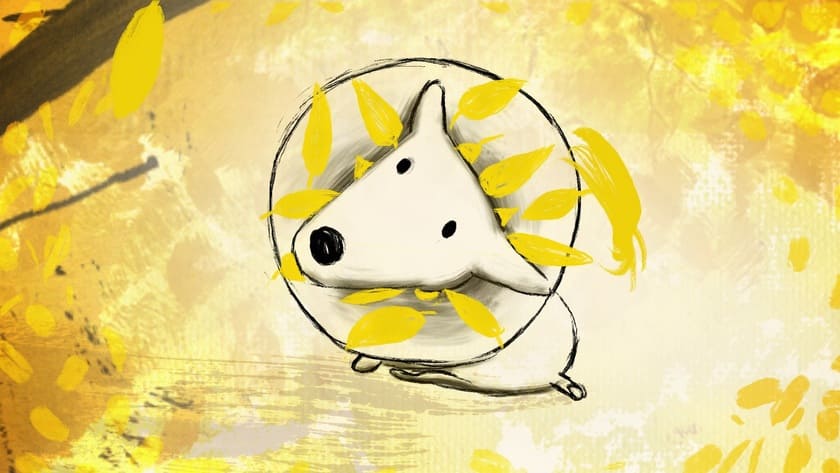
Yellow Light
In the Croatian program, the leader was undoubtedly the winner, 'Eeva' (also present in the main competition), by a known Croatian-Estonian duo Lucija Mrzljak and Morten Tšinakov, a highly stylized yet sensually dense exercise in absurd dramatic comedy with all the shades of darkish humor. The hot blend of two distinct animation schools is as if harmonized both in graphics and narrative twisted logic that leads through gags and turns to an unexpected yet inexorable date with destiny as a refined coda.
Not to miss here too, is ‘Family Portrait’ by Lea Vidaković (Croatia, France, Serbia, 2023; also in main competition), already reviewed in Zippy Frames. But – back to side shows – it was also featured in a special solo exhibit, with quite expressive puppet sets and just striking multi-screen projection punctuated with pauses and delayed transitions – which provoked a heretical thought that maybe this was, in fact, the ultimate mode of presenting, in sync with film’s deeper tone and meaning (and once again indicating or crossing the boundaries between animation sub-cultures/environments). And certainly an eyecatcher, in a specific way: ‘The Following Season’ by Natko Stipaničev (also in main competition) – real or pre-post-apocalyptic landscapes endlessly metamorphosing, reportedly with AI assistance, to somewhat uncanny valley-like effect.
Finally, among student works, ‘Opening Night’ by Sara Szymańska (The Polish National Film, Television and Theatre School in Lodz, Poland, 2023) caught my eye: a moody love-relations story, stylistically and narratively following closely in the mentor, Mariusz Wilczynski’s footsteps – big shoes to fill, certainly, and quite idiosyncratic ones; promises perhaps a hard-earned adventure ahead.

Opening Night
And then, as one for the road, comes my way ‘Foreign Side’ by Sara Tomas (Academy of Fine Arts Zagreb, Croatia, 2023; also in Croatian competition) – opening up the beloved city for or in a stranger's sight in a delicate collage of techniques and angles; a perfect, if a bit sad, waving goodbye as well to a periodic guest like myself, who would never have enough breaks and peace of mind to visit the place at ease, free of the obligatory and other pressures of the day and time.
(central image: Eeva by Lucija Mrzljak and Morten Tšinakov)
contributed by: Mikhail Gurevich




